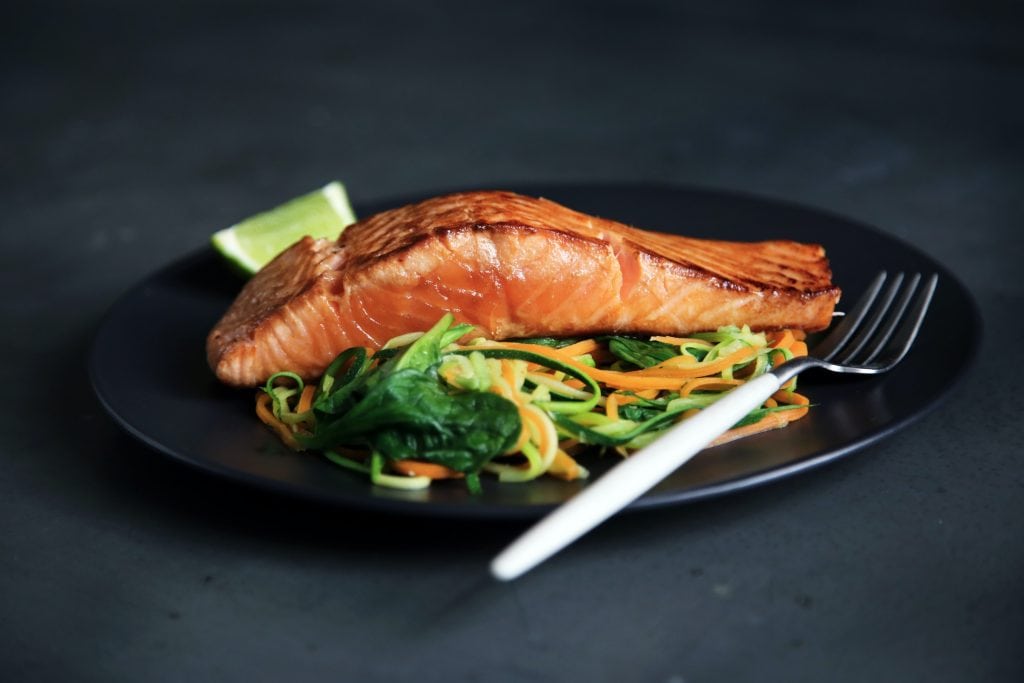Whether you’re seriously ill with a life-threatening disease or feeling fit as a fiddle, it is of fundamental importance to have a healthy diet. Recent research has provided considerable support for some traditional advice, such as the importance of drinking water and eating fruit and vegetables, while also revealing the dangers of consuming certain commonly available food products.
After studying the research, I’ve compiled my top ten tips for a healthy diet. Don’t worry if you can’t face following them all at once – you can follow them in steps, and very soon you’ll be maximising your body’s ability to function efficiently, ward off disease and heal itself.
1) Drink lots of water
You’ve probably heard it before: we’re composed of 70-80% water – it’s true! As well as being the main component of blood and other body fluids, water plays a vital role in maintaining correct body temperature and flushing toxins out of the body. You should aim to drink at least 1.5-2 litres a day.
2) Eat plenty of fruit and veg
Fruit and vegetables are simply the best kinds of food for us. Firstly, they are high in fibre, which is essential for the digestive system to work efficiently. Colonic and heart diseases, as well as MS, diabetes and obesity are all highly associated with a low-fibre diet.
Secondly, they provide a variety of essential minerals and vitamins.
Thirdly, most fruit and vegetables contain pigments such as carotenes and flavonoids, which are powerful antioxidants that provide significant protection against cancer, heart disease and strokes.
3) Buy organic when possible
Having now persuaded you (I hope!) of the importance of fruit and vegetables, I should point out that organic produce is preferred for foods you often eat in your diet.
There are over 400 different pesticides and fertilisers used in crop farming. Many of these artificial chemicals have been linked to diseases, and it is no wonder that farmers themselves have an increased incidence of serious illnesses.
Organic produce is grown without the use of any of these harmful chemicals, and it is therefore much safer.
4) Consume fish and fish oils

As well as providing us with nucleic acids needed for our cells, fish naturally provides oils, which neutralise harmful free radicals in the body. (Free radicals are highly reactive molecules that rip parts off healthy molecules – such as DNA – often leading to cancer.)
Fish oils also contain omega 3, a long chain molecule that also reduces the risk of cancer and heart disease. If you are vegetarian or vegan then please look for essential fatty acids from good quality oils, seeds and nuts.
5) Cut down on dairy
Remember a few years ago we were all being told to ‘Drink a pint of milk a day’?
Research now shows that cows’ milk, while extremely good for baby cows, can be harmful to humans because the high levels of fat and protein in milk prevent the absorption of the mineral zinc, which is necessary for vitamin C absorption.
Secondly, some dairy products have been found to contain hormones, antibiotics, toxins and pesticides, all of which can have a damaging effect when consumed over a period of time. ‘But what about calcium?’ you may be wondering.
Don’t worry, we can get it from the same place that cows get it – leafy green plants – for cows, the plants are grass, for us they’re vegetables!
6) Cut down on sugar and saturated fats
Sugar can have a devastating effect on health because: A, it imbalances the levels of minerals in the body; B, it disrupts the functioning of glands; and C, it suppresses the immune system.
Equally destructive are saturated fats and oils, such as those in animal fat (meat and dairy), as well as in junk, processed and fast foods.

7) Avoid food additives – especially colouring agents and artificial sweeteners
While some additives stop the growth of food-poisoning bacteria, the vast majority are used for cosmetic purposes – to give food more colour, or to give it a stronger, sweeter or creamier taste.
Unfortunately, many additives have been found to cause health problems such as asthma, rashes and hyperactivity. Most alarming of all are nitrites (meat preservatives, E249-E262) and artificial sweeteners, many of which have been linked to disease.
8) Reduce your intake of salt
We get all the sodium we need from the natural ingredients of food. Unfortunately, the extra that we get from prepared foods, in cooking and as a condiment is not only unnecessary, but actually very harmful.
Too much salt upsets the natural potassium-sodium balance and is thought to play a major role in the development of cancer and cardiovascular problems such as heart disease, strokes and high blood pressure.
9) Strive for an alkalising diet
You’ve probably heard of acid rain, but have you heard of the human equivalent, acidosis? The body performs best when slightly alkaline (a pH of 7.4), but most Western diets nowadays contain an abundance of acid-forming foods.
A few years of this imbalance can lead to serious consequences, including heart disease and cancer. Try to cut down on acid-forming food and drinks like alcohol, cakes, chocolate, coffee, crisps, fizzy drinks, eggs, meat, milk, salt, sugar and tea.
Instead, try to consume more alkalising food and drinks like most fruit and vegetables, green tea, herb teas, millet, fresh cracked nuts and seeds.
10) Take a regular supplement of minerals and vitamins
As I’ve explained above, fruit and vegetables are by far the most important kinds of food for humans. In addition to most forming alkaline residues and providing fibre and antioxidants, they give us essential minerals and vitamins.
However, fruit and vegetables no longer provide them in the concentrations that they should because: A, soil is being depleted of minerals and vitamins due to over-farming; B, fruit and vegetables are often picked before the ripening stage when minerals and vitamins are formed; and C, the minerals and vitamins that were present when the fruit and vegetables were picked may well have broken down by the time the produce reaches the supermarket shelves.
For these reasons it is wise to take a daily supplement of a natural base not synthetic.
NOTE: Supplementation should only fill in the gaps where proper nutrition misses. You can’t take a supplement then eat junk food all day, for example.
